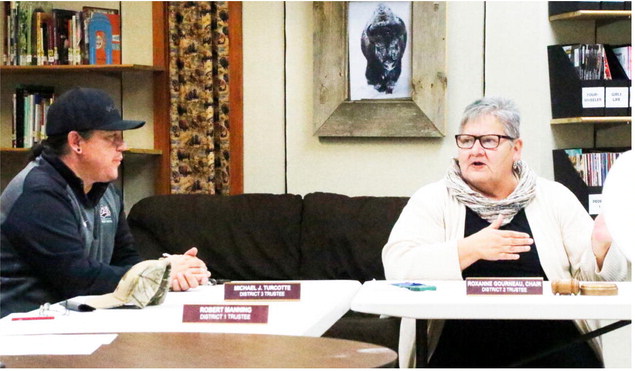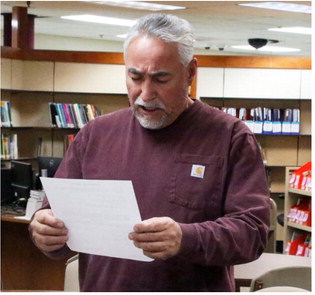Initiative Seeks To Give Landowner Hunters More Rights
Despite being told repeatedly that it would lead to instant litigation and the likely rescinding of any hunting and fishing rights for non-tribal members on Confederated Salish and Kootenai Tribes lands, all eight Republican legislators on the Environmental Quality Council voted recently to support a ballot initiative that seeks to give landowners in Montana broad access to hunt deer, elk and black bears on their own land.
But the council will officially be listed on the ballot petition for Initiative 193 as not supporting the measure because the four members of the public and four Democratic lawmakers on the council voted against supporting it, and a tie vote means it did not have majority support of the council.
“I’ve looked at a lot of issues over time here, and this one really puts the ‘um’ in ‘dumb,’” said Jim Keane, a public member of the council and former longtime Democratic legislator from Butte. “It really does. It is so self-serving that it is just unbelievable.”
I-193, also known as Ballot Issue No. 10, was proposed by Rick Schoening, a retired Montana Fish, Wildlife and Parks game warden from Polson who is now the Lake County justice of the peace.
As stated on the petition, the initiative, if it makes next November’s ballot and is passed by voters, “prohibits hunting regulations that would impose or effect a prohibition on a landowner hunting deer, elk or black bear on the landowner’s private property during a statewide general hunting season.”
It goes on to say: “Landowners would still need to be licensed and follow all hunting laws and regulations pertaining to means of take and bag limits. An exception would allow the fish and Wildlife Commission to limit this landowner hunting right when wildlife populations are in severe decline due to environmental factors such as disease or drought.”
The initiative also says that, if passed, it could result in less non-resident hunting license revenue coming into the state and would likely require the state to hire more game wardens to enforce regulations.
Proponents see unfair landscape for non-tribal landowners on reservations Schoening and Rep. Joe Read, R-Ronan, were the only two proponents of the measure who spoke at Wednesday’s EQC hearing. Both also happen to live on private land they bought or inherited that sits within the Flathead Indian Reservation’s boundaries, where non-enrolled members are not allowed to hunt big game regardless of whether they own land.
“Unjustly, landowners living within the exterior boundaries of the seven Indian reservations do not have the same rights as landowners living outside of these political boundaries,” Schoening told the committee. “This is wrong. We are citizens and taxpayers just like the rest of the people.”
He told the council he was representing himself and “private landowners of over 3.3 million acres” that he wants to open to hunting and has pledged to pursue since his time as a warden.
In his presentation to the committee, Schoening said the initiative is clear cut in his view and would simply allow for private, non-tribal landowners to hunt on their land, as he says was the case with regulations up until the 1950s. He said it was “not the case” that there is a possible loophole in the initiative’s language opponents had already pointed out, which they feel could allow for wealthy people to buy up ranch land in special permit hunting districts for trophy elk and deer.
“It says in the law, in the initiative, that you must hunt in a manner provided by law and regulations pertaining to means of take and bag limits. So, that clears it up right there. There’s no way that this will allow anybody to go around and get a big bull permit in the [Missouri] Breaks,” he told the council in an effort to rebut opponent testimony that was to come.
Read, who sponsored House Bill 241 in the 2021 session, which sought to implement very similar changes but died after its first committee hearing, said he supports the initiative again this time because deer and elk are feeding on his fields and he would like to be able to regulate them, though the tribe regulates animal populations on the reservation and can do so on private land as well if asked by the landowner.
“My whole goal is to redevelop a constitutional right and a Montana constitutional prerogative that the state of Montana does enforce and promote hunting rights,” he said.
Opponents say initiative infringes on public trust doctrine, tribal sovereignty But CSKT tribal council members, their attorney and more than a dozen opponents listed off numerous reasons they felt giving support to the initiative, including that it will certainly lead to litigation surrounding tribal sovereignty, likely harm tribal-state relations, and put private landowners above the public trust. CSKT officials submitted an extensive comment in opposition to the proposal in November which Schoening rebutted.
Tom McDonald, the tribal council chairman for the CSKT and a former CSKT Fish and Wildlife Program resource manager and director, said the initiative would put the tribes’ longstanding agreement with the state to allow non-tribal members to fish and hunt birds on tribal lands, which was made in the midst of litigation, at risk.
“We have over 70 years of precedent here. We have a great working relationship with the state of Montana Fish and Wildlife management,” he said. “This initiative in itself jeopardizes all of that hard work, all of our relationships, all the great resources we have in this state. And I can’t overemphasize how much jeopardy this put into all of that.”
Other CSKT members said treaty rights allow the tribes to manage the wildlife on their lands and that singular private landowners should not be able to try to change those treaties and tribal sovereignty at a state ballot box.
“My thought is that the big game on our reservation is owned and managed by the people of the Confederated Salish and Kootenai tribes,” said Rich Janssen Jr., the department head of natural resources for CSKT. “It’s pretty simple. He bought land here; he knew what he was getting into. I’m sorry to hear that, but that’s just the way it is.”
CSKT Staff Attorney John Harrison said he “fully expects” the tribes would resume litigation if the measure were to pass.
“This is someone looking to fulfill a personal goal of hunting on their own property within a reservation, but the impacts reverberate far, far past that for all Montanans,” he said.
Jock Conyngham, another non-tribal landowner on the Flathead reservation, said he and the Montana Sportsman’s Alliance were opposed to the initiative because they feel it violates tribal sovereignty and the “strikingly vague” language could lead to unpredictable changes with hunting and wildlife management. He said the latest version of the proposal contained no merit and all of the risk of the 2021 bill.
“I bought my place decades ago in the full knowledge I wouldn’t be able to hunt big game there. Instead of resentment, I feel instead deep gratitude to the CSKT for their hospitality and allowing me to hunt and fish tens of thousands of tribal acres,” he said. “… I want to honor the goodwill that the tribes have shown and not threaten it.”
Frank Szollosi, the executive director of the Montana Wildlife Federation, said the group was disappointed in seeing the initiative, which the attorney general found legally sufficient at the end of November, after outdoors and environmental groups worked together well during the session.
He, too, believes if the initiative were to make the ballot and pass, the CSKT would revoke nontribal fishing and bird hunting allowances. He, as did others, said the initiative also violates the public trust doctrine, which says that the public is the owner of natural resources, not private landowners.
But Schoening and Read said they believe that as state taxpayers and landowners, they are afforded the right to hunt on their own land under the state Constitution.
Republicans support I-193
Before the vote, Democrats on the committee voiced similar concerns as the opponents about what they call the initiative’s vague language, the lack of acknowledgement of the public trust doctrine, tribal sovereignty, and the legality of the effort.
“This is clearly not a legal step to take. It hasn’t been developed in collaboration with the tribes. The language is vague enough that it causes problems not just on the reservations, but beyond,” said Rep. Marilyn Marler, D-Missoula. “… If this passes, there is going to be litigation and the state will lose.”
Republicans on the council were keen on the measure, however, mostly saying they viewed the initiative solely as a private property issue and that they feel property owners should have the same rights regardless of where they live, though Rep. Jonathan Karlen, D-Missoula, also pointed out that FWP is not funded by property taxes.
Rep. Jed Hinkle, R-Belgrade, said he felt the initiative would actually increase the public trust because the current inability for landowners to hunt on tribal lands is diminishing it. Rep. Paul Fielder, R-Thompson Falls, said citizens should get to decide the matter after other attempts failed. And Sen. Steve Hinebauch, R-Wibaux, said he was not concerned about potential litigation and its costs.
“I guess I’m gonna be a yes on this initiative. I guess one reason is because I am a big private property guy. And the other thing is, I always hate the threat that if we do this, somebody’s gonna sue us,” Hinebauch said. “And I guess my thought is let them sue us.”
Keane, one of four public members of the council, retorted.
“I’m sure glad that some of the representatives out there believe that the legal system needs more work, and this will sure do it for them,” he said. “So I’m a no, but recognizing that it’ll be a very expensive, cost-effective way for the legal system to move forward to feather their unnecessary coffers.”
Shortly afterward, all eight Republican council members voted to support the measure, while the four Democrats and four public members voted against it. That means that the petition will show the 8-8 vote and that the council did not support it.
Schoening will now have to collect signatures from 5 percent of the number of qualified voters in Montana who voted in the 2020 governor’s election, including 5 percent of voters in at least 34 state House districts, in order for the initiative to make the ballot next November.
FWP did not have any representatives at the meeting. In a statement afterward, FWP director Dustin Temple said the agency could not take a position on any initiatives.
“We understand this is a topic of interest for hunters around the state, but in accordance with state law, FWP and its staff will offer no opinions on this matter,” he said. “However, we will be ready to answer factual questions as they arise from lawmakers reporters, or members of the public.”

